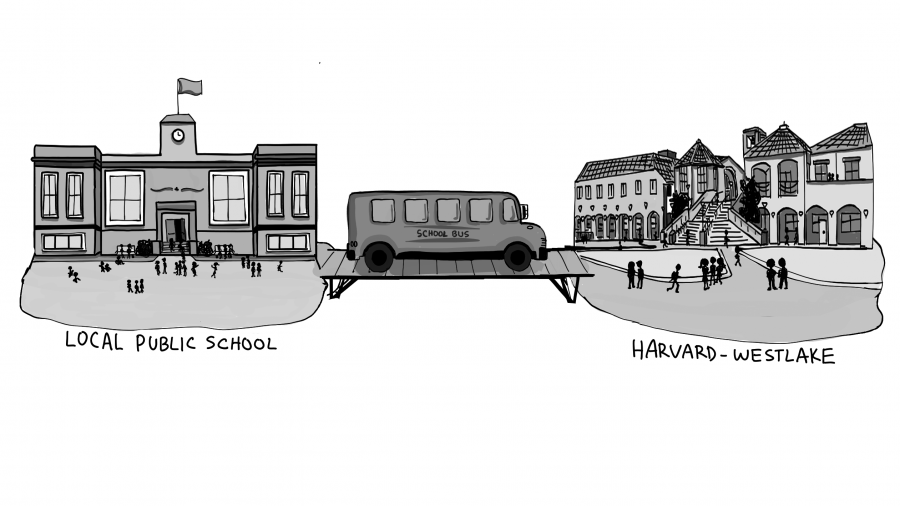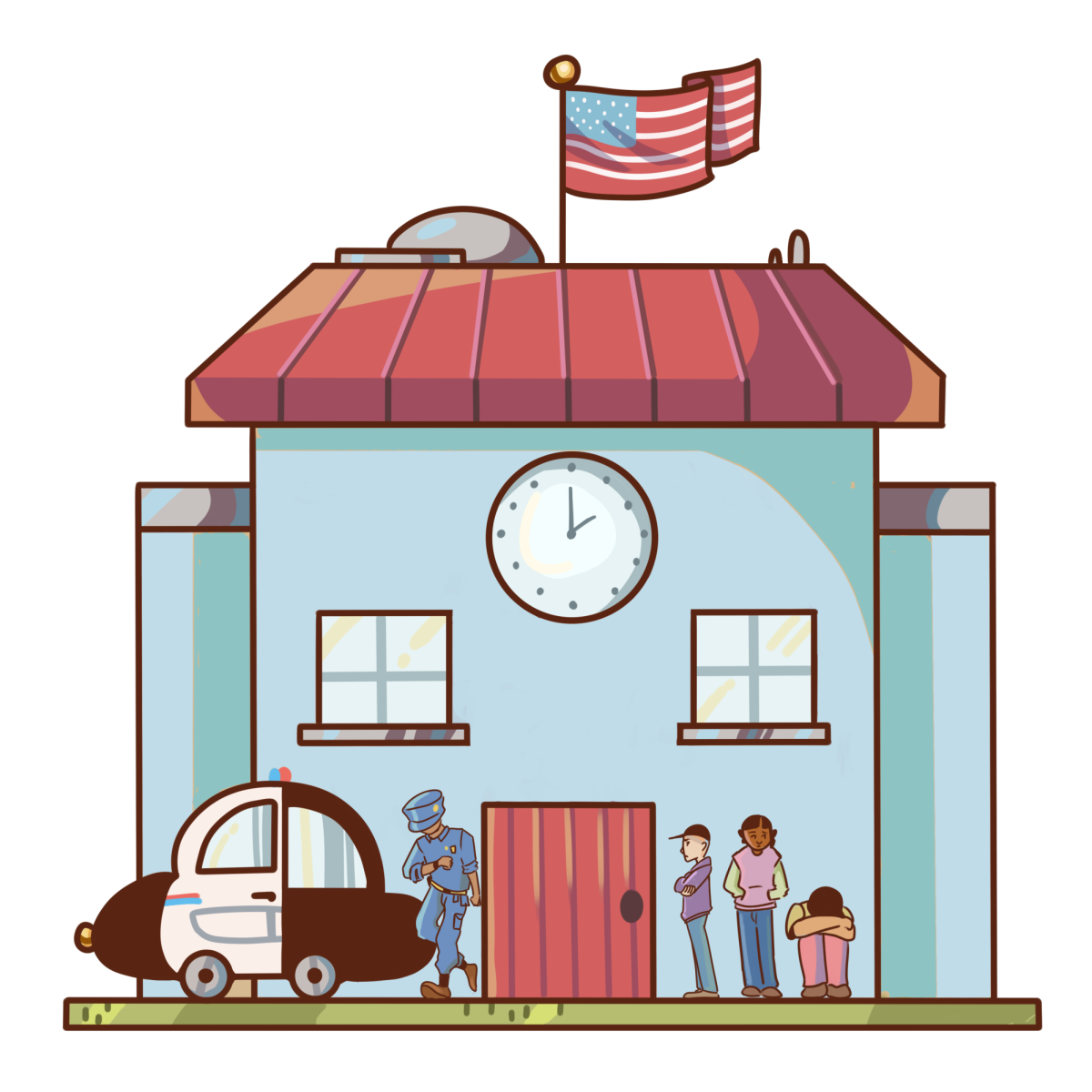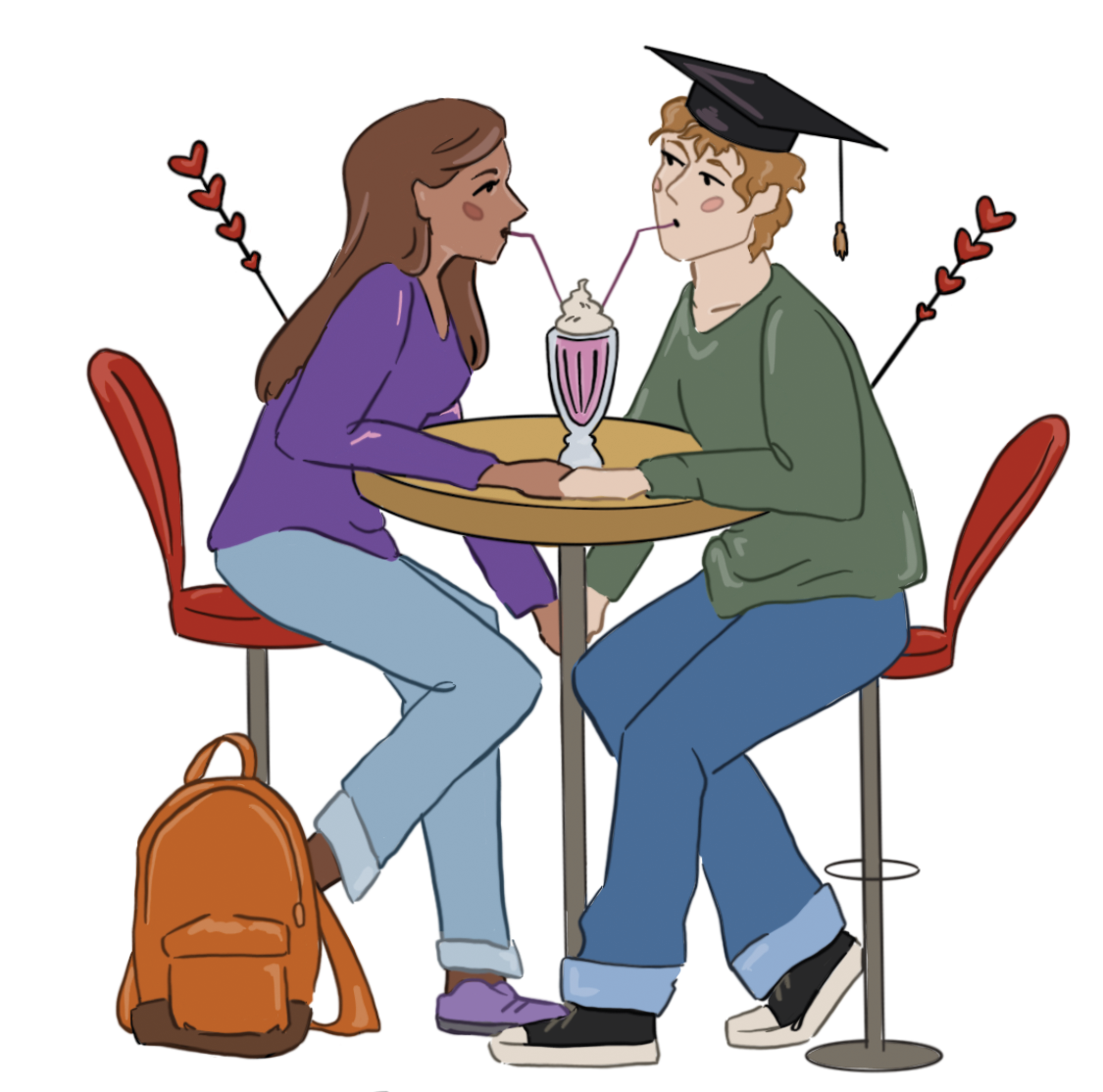As Josue Gutierrez ’18 gazed out the window on the long bus ride home after his first day of ninth grade at Harvard-Westlake, he felt stunned and overwhelmed. Basketball tryouts. Nine periods every day. A new, strange school, far from his home.
“I came home and I didn’t know what to do and I just shut down a little bit,” Gutierrez said. “I went to my parents and told them I was frustrated and I didn’t know how to handle everything.”
As a new ninth grader from John Adams Middle School, Gutierrez said his initial transition to Harvard-Westlake was not seamless.
“I had always been used to being the best in my class every single year and coming to Harvard-Westlake, I really had to get into the mindset that it’s okay to not be the best in every class and to get a bad grade every once in a while,” Gutierrez said.
Similarly, London Alexander ’18 noticed a significant academic adjustment after starting at Harvard-Westlake.
“At public school, I had a 4.0 [GPA] and I worked hard, but it wasn’t like [school] was hard,” Alexander said. “I did my best and I got an A. Here, you do your best and it’s like, ‘Oh no.’”
Matriculating to Harvard-Westlake from Palms Middle School, a public school, she said she was expecting to be academically unprepared. To accommodate for this, she worked harder than she needed to at the beginning of her ninth grade year, she said.
Gutierrez noted a similar sentiment.
“What I always tried to do was work as hard as I could even if I didn’t need to,” Gutierrez said. “Just because I go to Harvard-Westlake doesn’t mean I’m going to work any less hard. I want to make sure that if I’m here I’m going to deserve my spot.”
PJ Smith ’19, who also started at Harvard-Westlake as a new ninth grader, said he did not anticipate the school’s difficulty level.
“I had just as hard work [in middle school], but there’s definitely more work here,” Smith said. “I thought I would be over-prepared. It’s not like [the transition] hit me like a wave, but it was definitely more than I was expecting.”
Middle School Dean Jon Carroll said he sometimes sees incoming students from public schools find adjusting to to Harvard-Westlake’s academic expectations to be difficult.
“The easiest transitions I have observed are the ones where the student already has a connection to the school via a sibling, or one of our programs loosely affiliated with the school, including PBA Baseball or Premier Water Polo,” Carroll said in an email. “The more difficult transitions are for students who don’t have those affiliations to our community. I find many public school students in the latter category and I think the school can help make that transition easier by continuing to add strategic opportunities for new students to make connections to the community.”
In addition to summer classes, Carroll said that incoming students could also benefit from organized social events.
“In the same way that the Admissions Office does a special reception before the seventh grade Welcome BBQ for students who are the only ones coming from their sending school, perhaps a similar Summer Institute could be organized for ninth graders from public schools to address not only the social challenges they face bonding with students who have been together for two years, but also the academic expectations of Harvard-Westlake ninth graders,” Carroll said. “This would be in addition to Fast Start.”
Gutierrez said his personal situation made his social adjustment a constant obstacle. According to a Chronicle poll of 321 students, 83 percent of students think access to transportation and money make socializing at Harvard-Westlake significantly easier.
“People will say, ‘We should all go eat at some place,’ and I don’t have the opportunity to do that,’ Gutierrez said. “I’m a big sports fan. I just can’t really come to [Harvard-Westlake] games because transportation is always really tough for that. I would love to go to a football game, but unless I have my own car, which I don’t right now, I would have to use my parents and they have work or stuff that they need to do.”
According to a Chronicle poll of 323 students, 65 percent think that social groups at Harvard-Westlake are influenced by socioeconomic status.
“I feel like at Harvard-Westlake, a lot of the people who are on financial aid and did come from a public school group together,” Alexander said. “It’s not on purpose, but I feel like most of my close friends are on financial aid. I guess you cling to people who are like you. I don’t know if that’s good but it’s something I’ve noticed.”
Unlike while spending time with her Harvard-Westlake friends, when Alexander sees her out-of-school friends, she does not feel pressured to spend money.
“At Harvard Westlake, when you hang out with your friends it’s always like, ‘Let’s go to a fancy brunch,’ and you have set plans and it’s usually eating,” she said. “When I hang out with my friends outside of school, we literally just hang out at someone’s house, or walk, since we don’t have cars, to get frozen yogurt, which is like 3 dollars.”
Overall, Gutierrez and Alexander said the entire school atmosphere at Harvard-Westlake differs substantially from that of their sending schools.
“I think that kids who have never gone to public school don’t understand just how great schools like Harvard-Westlake are,” Gutierrez said. “I think they kind of take things for granted and don’t really appreciate all the resources, the events and the teachers especially. Students here are really quick to complain about a lot of things. They’ll say something like ‘The cafeteria doesn’t have a lot of options today.’ If you went to public school, you’d have one thing or you wouldn’t eat.”
Though he expressed gratitude for Harvard-Westlake’s small class size, cafeteria food, and wealth of opportunities, Smith said that for people who have never attended a public school, it’s easy to make generalizations about the entire system.
Prior to Harvard-Westlake, Smith attended the Individualized Honors Program at Walter Reed Middle School, a program designed for students who are “are identified Highly Gifted by LAUSD or submit evidence to support possible future identification” and “have national percentile achievement scores 97 percent to 99 percent in both English and math,” according to the Walter Reed Middle School website.
“If you’re in IHP, where I came from, you’re going to college and you’re going to a really good college,” Smith said. “I’ve never thought in my life, ‘Oh, I went to a public school. It looks like I’m not going to college.’ But apparently, that’s what a lot of people do think [about all public schools]. That’s definitely not true.”
Despite his difficult transition to Harvard-Westlake, Gutierrez expressed that past personal situations ultimately don not hinder the formation of strong relationships between students.
“As you grow to know people, you learn that even if you had different life experiences, good people are good people and you’re going to find that anyways,” Gutierrez said.



































